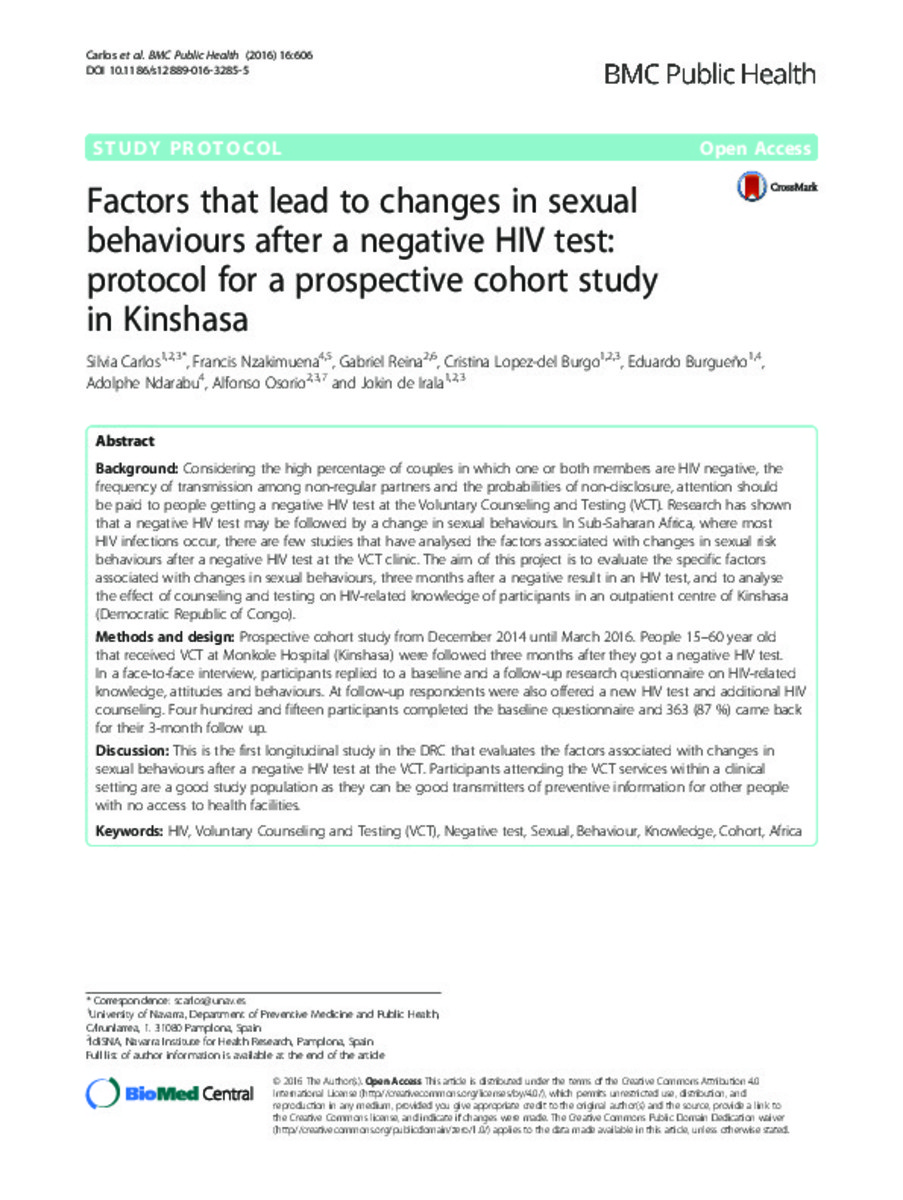Registro completo de metadatos
| Campo DC | Valor | Lengua/Idioma |
|---|---|---|
| dc.creator | Carlos-Chillerón, S. (Silvia) | - |
| dc.creator | Nzakimuena, F. (Francis) | - |
| dc.creator | Reina, G. (Gabriel) | - |
| dc.creator | Lopez-del-Burgo, C. (Cristina) | - |
| dc.creator | Burgueño, E. (Eduardo) | - |
| dc.creator | Ndarabu, A. (Adolphe) | - |
| dc.creator | Osorio, A. (Alfonso) | - |
| dc.creator | Irala, J. (Jokin) de | - |
| dc.date.accessioned | 2016-10-11T12:46:16Z | - |
| dc.date.available | 2016-10-11T12:46:16Z | - |
| dc.date.issued | 2016-07-20 | - |
| dc.identifier.citation | Carlos S, Lopez-Del Burgo C, Ndarabu A, et al. Factors that lead to changes in sexual behaviours after a negative HIV test: Protocol for a prospective cohort study in Kinshasa. BMC Public Health [serial online]. July 20, 2016;16(1) | es_ES |
| dc.identifier.issn | 1471-2458 | - |
| dc.identifier.uri | https://hdl.handle.net/10171/41725 | - |
| dc.description.abstract | Background: Considering the high percentage of couples in which one or both members are HIV negative, the frequency of transmission among non-regular partners and the probabilities of non-disclosure, attention should be paid to people getting a negative HIV test at the Voluntary Counseling and Testing (VCT). Research has shown that a negative HIV test may be followed by a change in sexual behaviours. In Sub-Saharan Africa, where most HIV infections occur, there are few studies that have analysed the factors associated with changes in sexual risk behaviours after a negative HIV test at the VCT clinic. The aim of this project is to evaluate the specific factors associated with changes in sexual behaviours, three months after a negative result in an HIV test, and to analyse the effect of counseling and testing on HIV-related knowledge of participants in an outpatient centre of Kinshasa (Democratic Republic of Congo). Methods and design: Prospective cohort study from December 2014 until March 2016. People 15-60 year old that received VCT at Monkole Hospital (Kinshasa) were followed three months after they got a negative HIV test. In a face-to-face interview, participants replied to a baseline and a follow-up research questionnaire on HIV-related knowledge, attitudes and behaviours. At follow-up respondents were also offered a new HIV test and additional HIV counseling. Four hundred and fifteen participants completed the baseline questionnaire and 363 (87 %) came back for their 3-month follow up. Discussion: This is the first longitudinal study in the DRC that evaluates the factors associated with changes in sexual behaviours after a negative HIV test at the VCT. Participants attending the VCT services within a clinical setting are a good study population as they can be good transmitters of preventive information for other people with no access to health facilities. | es_ES |
| dc.language.iso | eng | es_ES |
| dc.publisher | BMC Public Health | es_ES |
| dc.rights | info:eu-repo/semantics/openAccess | es_ES |
| dc.subject | HIV | es_ES |
| dc.subject | Voluntary Counseling and Testing (VCT) | es_ES |
| dc.subject | Negative test | es_ES |
| dc.subject | Sexual Behaviour | es_ES |
| dc.subject | Knowledge | es_ES |
| dc.subject | Cohort | es_ES |
| dc.subject | Africa | es_ES |
| dc.subject | Materias Investigacion::Ciencias de la Salud | es_ES |
| dc.title | Factors that lead to changes in sexual behaviours after a negative HIV test: protocol for a prospective cohort study in Kinshasa | es_ES |
| dc.type | info:eu-repo/semantics/article | es_ES |
Ficheros en este ítem:
Estadísticas e impacto
Los ítems de Dadun están protegidos por copyright, con todos los derechos reservados, a menos que se indique lo contrario.






